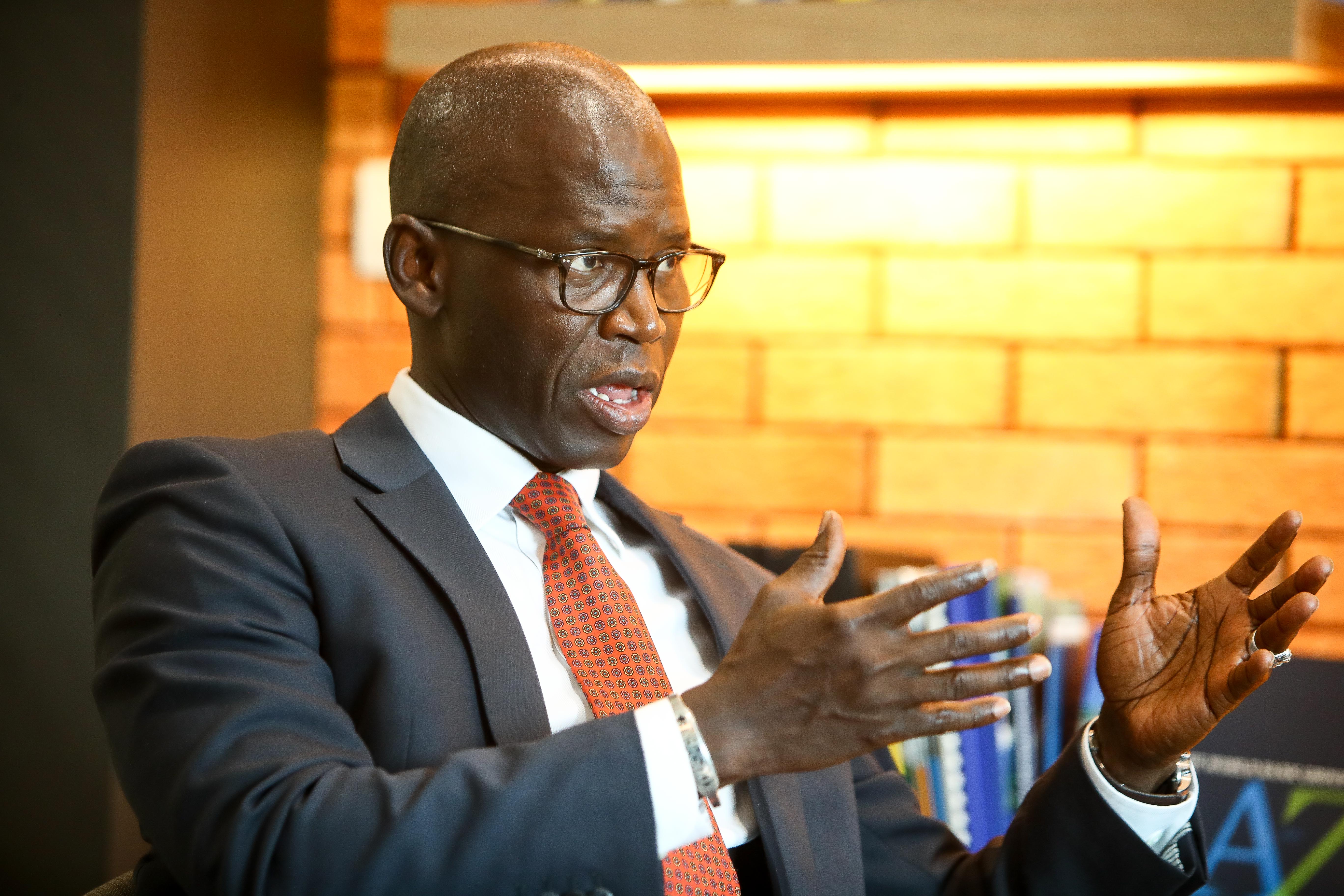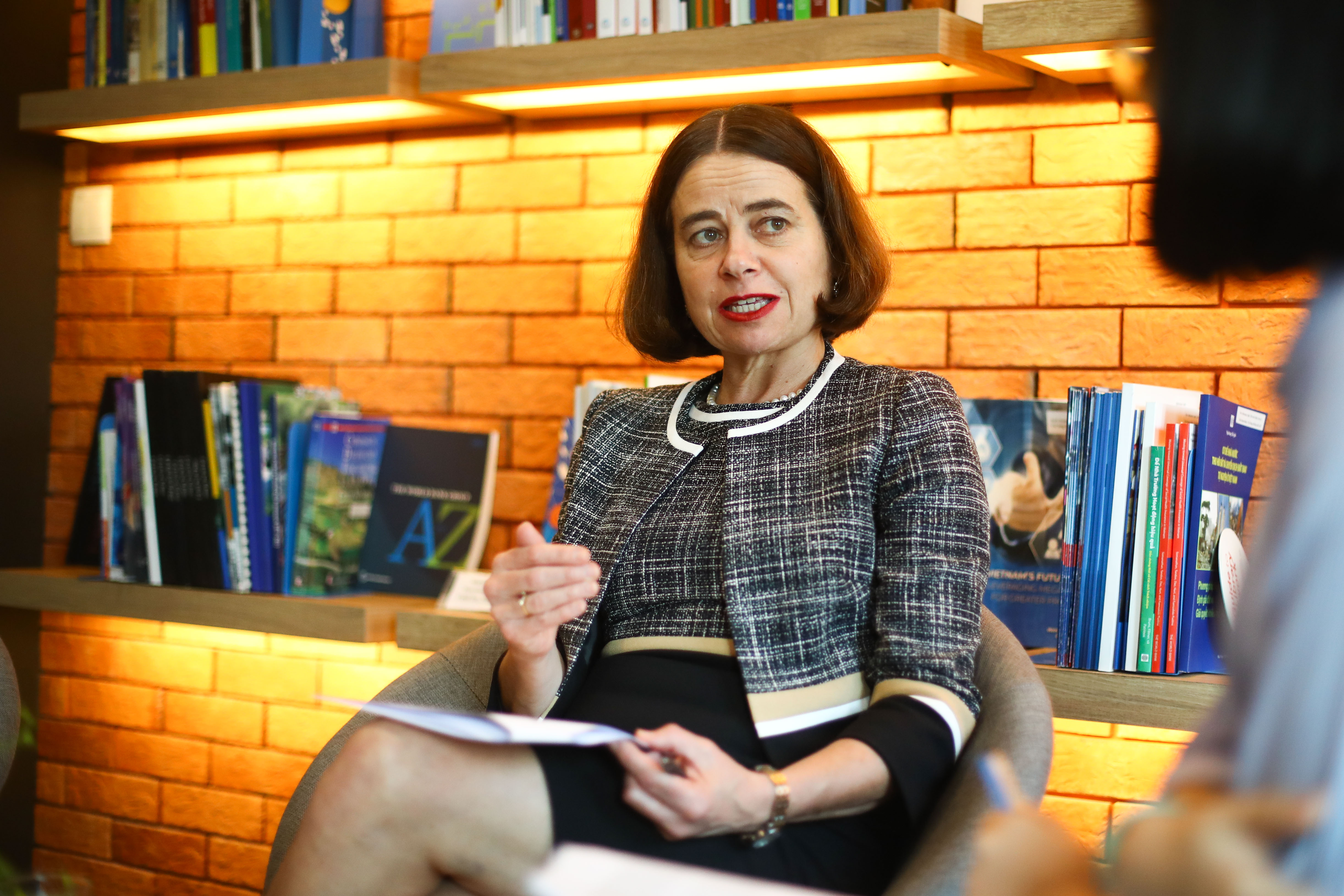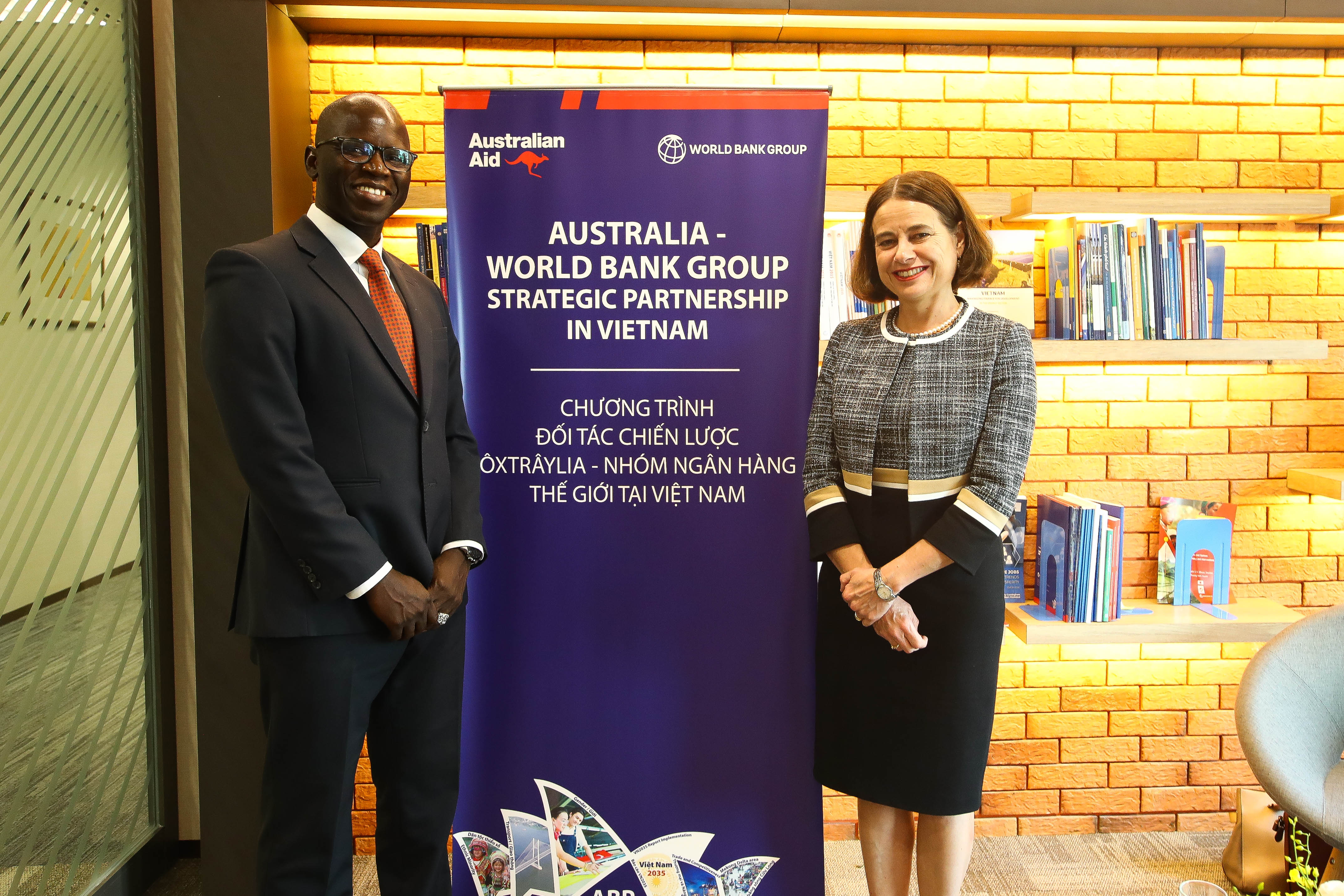In 2016, the Vietnamese government collaborated with the World Bank (WB) to launch the ‘Vietnam 2035’ report – an ambitious vision outlining a plan to transform the Southeast Asian nation into an upper-middle-income country with a GDP per capita of US$10,000 per year.
More than three years has passed since the report was issued.
As we are stepping into a new decade, Tuoi Tre (Youth) newspaper hosted a round-table meeting with WB country director for Vietnam Ousmane Dione, Australian Ambassador to Vietnam Robyn Mudie, and former head of Vietnam Institute for Development Strategies Bui Tat Thang to reflect on what has been done to achieve those goals, while discussing the opportunities and challenges waiting ahead.
In 2035, Vietnam will celebrate its 60-year anniversary since the reunification in 1975.
As Dione said, at that age in life, a person has a combination of experience and maturity, especially the wish to leave a good legacy.
The legacy Vietnam expects to see in 2035 involves a prosperous country with a clean and sustainable environment where all Vietnamese are able to benefit from green growth and act as citizens of the world, he said.
Since the launch of the report, Vietnam’s GDP has witnessed an impressive growth rate of 6-7 percent per year. Different reviews by the government, World Bank, and other agencies also indicated remarkable reform progress, especially in 2018 and the first half of 2019. What changes do you think are the most significant?
Ousmane Dione: Vietnam’s GDP has grown 6-7 percent over the last three years. At the same time, a number of policies have been enacted by the government, taking into account the fact that the country needs to move faster, foster innovations, translate them into jobs and economic growth, attract foreign investment like FDI (foreign direct investment), improve the environmental condition, and promote the private economic sector.
Resolution No. 10, issued in 2017, considered the private sector as an important engine of growth, providing strong momentum for it to develop and strengthen. Vietnam also made concerted efforts in reforming regulatory frameworks with Resolutions No.19 No.2 in 2019. Such reforms improveVietnam’s ranking in international benchmarks.
Vietnam has taken efforts to deepen economic integration with the CPTPP (Comprehensive and Progressive Trans-Pacific Partnership) signed in 2018 and EVFTA (EU-Vietnam Free Trade Agreement) signed in 2019 as significant examples. This is critical for an open economy like Vietnam and can result in robust export growth and FDI inflows.
We have seen Vietnam making progress on this. At the same time, we believe that more can be done.
Bui Tat Thang: I think there were three significant achievements. First, the 12th National Congress of the Communist Party of Vietnam has recognized the private economic sector as an important engine of the economy. The Party has issued Resolution No.10 on developing the private sector and offered assistance policies, especially the Fund for Development of Small and Medium-Sized Enterprises. All these components along with the institutional reform, sub-license reduction, and liberation of activities of the private economic sector have helped the country thrive toward the goal of one million enterprises by 2020.
There are some large private corporations that have built a strong reputation, taken the lead in some areas, and started expanding into manufacturing and providing public and social services. That trend needs encouragement.
Vietnam is witnessing tremendous change. It jumped ten places in the 2019 Global Competitiveness Index. This is such a significant recognition for the start-up nation.
The second achievement is innovation which serves as a backbone for the development of private economic sectors in the context of Industry 4.0. This is also a breakthrough in the ten-year development strategy, from 2021 to 2030.
Further integration into the world economy is the third achievement. All of them have helped build a strong foundation for the country’s economy to accelerate in the next phase.
2035 is 15 years away. Facing unpredictable challenges, how should Vietnam change to realize visions set in the report?
Ousmane Dione: In future periods, the challenges will be much more complex and difficult. This is one of the reasons why we always encourage Vietnam to further conduct reforms while the time is appropriate and the context is favorable to prepare for the headwinds of the two next circles before 2035.
Most of the recent reports turn toward the stagnation of economies worldwide. Vietnam which has been an open economy needs to be prepared in order to withstand the shock of a slowdown.
Vietnam also needs to pay attention to and manage its natural capital.
The third challenge is how Vietnam is going to build strong human capital which pushes the country to the forefront of innovation, technology, and the digital agenda.
It is important to have a competitive labor force and competitive market and at the same time to have a strong institution to help the country move forward.
Transforming governance, paying attention to human capital, natural capital, and further embracing regional integration will be four key critical elements Vietnam must take notice of in order to achieve its vision for 2035.
The former president of the World Bank said the objectives of Vietnam 2035 can only be realized if Vietnam solves its problems with productivity growth and continued economic reform. Is this statement still valid?
Ousmane Dione: It is still strongly relevant today and there is much more work for Vietnam. That part cannot be done without economic reform, innovation, technology, and a digital agenda. The promotion of e-government, for example, is extremely critical in terms of digitalization to bring more productivity and transparency to citizens.
Besides, Vietnam cannot develop without recognizing existing challenges. The country is now facing a rapidly aging population. Therefore, the issue of fostering productivity must be linked to how the demographics of Vietnam change in the future. This is where notions of information, innovation as well as skilling-up come in. At the same time, it is critical to keep reforming in terms of pension, retirement policies and deciding what the future economy will be like.
This is why we keep saying while the economy is good, push the right reform and give us stronger reform.
If Vietnam manages to build strong human capital and skills that align with competitiveness and innovation, as well as quality infrastructure to support goals, and pays attention to the management of natural resources, then Vietnam can be an even faster, more successful middle-income country.
The question is: Is Vietnam doing it right?
Robyn Mudie:I also think this statement is still valid. Vietnam’s commitment to economic reform has been impressive and has delivered substantial economic benefit, including to productivity growth. Yet many of the easier reforms have been completed, with the remaining barriers to further productivity growth requiring reform that is both technically and politically difficult. As Vietnam’s existing labor-intensive growth model comes under pressure from rising wages, an aging population, Industry 4.0, and automation, the need to address these barriers will increase.
I am proud to say that Australia is here to help Vietnam address these challenges and share our own reform experience. Through our in-country partnership with the World Bank and our bilateral Aus4Reform program, Australia is helping Vietnam realize the ambitions outlined in the Vietnam 2035 report by supporting bold, innovative and sustainable productivity-enhancing reform efforts.
|
|
| Australian Ambassador to Vietnam Robyn Mudie speaks during a round-table meeting held by Tuoi Tre (Youth) newspaper. Photo: Nguyen Khanh / Tuoi Tre News |
In 2019, Vietnam experienced significant environmental problems, including the subsidence of the Mekong River Delta and air and water pollution in Hanoi. What should the country do to reduce and avoid environmental incidents in the future?
Ousmane Dione: A mountain surrounded by dirt is the first image rippling in my mind when being asked the question, similar to what I thought several years ago during a discussion when I worked in China. In other words, do you want to have economic growth which can be completely at the expense of the environment?
This is exactly the image that Vietnam of today needs to back in mind in order to avoid bitter consequences tomorrow.
Air pollution solely can cost Vietnam 3-4 percent of GDP per year. At present, only 20-30 percent of wastewater in Vietnam is treated. Meanwhile, within the last four years, Vietnam’s tourism has grown four times, from 4.5 million to more than 16 million people visiting the country, creating tremendous burdens to the local environment.
In my recent op-ed, I talk about PRIME approach, touching upon the importance of Planning, adequate Resources allocation, Information, comprehensive Management, and effective Enforcement.
Various policies have been adopted including the Law on Environment, the National Target Program on Climate Change and Green Growth, Decision No. 491 on solid waste treatment, and Resolution No. 120 on the sustainable development of the Mekong Delta, building resilience against climate change.
The fundamental question is that how they can implement those policies and demonstrate stronger commitments to climate change mitigation and nature conservation.
Boosting investments into clean energy and building a clean agenda are critically important for Vietnam. With a coastal line of 3,260 kilometers, Vietnam has full potential to develop wind and solar energy.
There are many different solutions but the determination of Vietnam’s government and people is the only key to push back impacts of climate change.
Robyn Mudie: There have been many changes in Hanoi since my first posting here 25 years ago. Cars and motorbikes have replaced bicycles, the population has grown and the city expanded, and construction and development have changed the Hanoi skyline. Just like many modern cities around the globe, this change has also brought with it many challenges including managing environmental impacts like air pollution. As you point out, these challenges are not just restricted to cities but also apply in rural and regional areas.
The key to addressing these challenges is to ensure economic growth and sustainable resource management go together in a mutually reinforcing way. Sound evidence-based government policies for sustainable development are crucial. Of course, solutions cannot be found by the government’s acting alone. Industries and businesses have a key role to play in supporting innovation and catalyzing change. Researchers and scientists need to play their part also in developing new technologies, but we can better support them with an enabling environment to commercialize the best ideas. Our youth can also be encouraged to play a pioneering role to better respond to climate change and increasingly complex environmental challenges through appropriate policies, training, and government support.
One example of how Australia is supporting this work is in the Mekong Delta – an area of critical importance to Vietnam’s productivity and stability. We are working with the World Bank through the Australia-World Bank Strategic Partnership to help Vietnam to implement the prime minister’s Resolution No. 120 and support climate-resilient development in the Mekong Delta. We are also sharing our experiences and lessons learned from Australia’s Murray Darling Basin – many of the challenges we face in Australia are similar to those that threaten the Mekong Delta.
|
|
| WB country director for Vietnam Ousmane Dione (L) poses alongside Australian Ambassador to Vietnam Robyn Mudie during a round-table meeting held by Tuoi Tre (Youth) newspaper. Photo: Nguyen Khanh / Tuoi Tre News |
What do you think about the role of young people in Vietnam’s development?
Ousmane Dione: The young Vietnamese generation has fantastic opportunities to make history. They have better education and globalization offers them opportunities to look at all that is happening across the globe to be inspired and from that to define the future of the country. That future should be built on inclusiveness, innovation, and capability for all people.
They are also facing emerging challenges of climate change, pollution or solid waste which require more breakthroughs to address. I am extremely confident that with the capacity, courage, and determination, Vietnamese youth will be able to overcome challenges.
Robyn Mudie: Like young people around the world, Vietnamese youths are becoming increasingly aware of the risks associated with exploiting natural resources without the necessary regulations, protections and focus on sustainability. Our future is in their hands. But the current generation has a crucial role to play too. We need to ensure that institutional and economic reforms focused on long-term sustainability are supported now to leave a strong legacy for the next generation to take over.
Vietnamese people think that spring heralds a new start. What message would you like to convey to Vietnam in the coming year?
Bui Tat Thang: I hope that all targets for 2035 will be realized since we set them based on careful consideration of both ambition and practicality. We are now enjoying favorable conditions of a high population, creativity and relatively good education. There is no reason for the economic and political institutions to hinder the development.
In the current context, although many challenges have still remained on the way, most Vietnamese people have the motivation to move forward. They have left behind a long, arduous road, enough to comprehensively understand how it feels like to live in poverty, to suffer war; therefore, they both aspire to peace and express fierce determination for a better life. If we have many good businessmen who can successfully enter the world market, we can rapidly bridge gaps in technology and other aspects. Conditions have been improved, all we need is stronger determination. The question is on us. Challenges and opportunities are two sides of the coin and we need more coherent policies to cope with challenges and turn them into motivations for development.
Robyn Mudie: Reflecting on our discussion today, a saying springs to my mind: “If you want to go fast, go alone. If you want to go far, go together." Vietnam and its people are strong, resilient, creative, and ambitious for the future. There’s no doubt that there are challenges ahead, but by working together I am optimistic that Vietnam can realize its aspirations. Australia is proud to be a friend and partner to Vietnam as we strive towards a secure, safe and prosperous future together. I wish you all health, happiness, and prosperity for the year ahead.
Ousmane Dione: 2019 marked 25 years of partnership between the World Bank and the government of Vietnam. We have been extremely proud and fortunate to be associated with every success that Vietnam has made over our past 25 years.
We are very determined and extremely committed to bringing more support to Vietnam in different agendas for the success and prosperity of the country and Vietnamese people as well as building strong partnerships with the international community among our strategic partners such as Australia.
Nguyen Viet Hung, founder, CEO – ColorME Design Training Center:
The government’s support and growing Internet platforms have offered Vietnamese youth the greatest-ever conditions to unleash their potential. We are witnessing the emergence of companies founded by amazing young entrepreneurs, such as ELSA – an English-learning app funded by Google, GoIT – the world’s first knowledge-as-a-service platform, and Topica – Southeast Asia’s largest edtech firm. Foreign investments in Vietnam over the past three years have reflected expectations that funds have held for the country’s start-up generation. As a young entrepreneur who is taking baby steps to the business world, I believe that Vietnam can develop more coherent policies to push innovation and utilize human capital.
This can be realized by following changes:
The first is to have more open policies and tax incentives for multinational corporations to encourage their expansion to Vietnam. Second, students must be encouraged to approach companies and experience different jobs in order to help them understand their own passion and make better choices. Third, we must promote programming and technology training for students from grade 1. Developed countries are now focusing on STEM education for children as they can learn fast and have no boundaries in creativity. With those changes, I imagine Vietnam can be a leading country in technology and innovation in the next 15 years.
Nguyen Huong Ly, vice principal – Maya Kindergarten:
Education is an essential foundation to develop a qualified workforce able to realize the country’s aspirations for prosperity in the near future. I believe that if every school in Vietnam can create an environment in which diversity is respected, children can truly be themselves and adults – teachers and parents – can step down, patiently observe, and support them to unleash their potential so our children can have a happy childhood and become happy adults in the future. We need safe environments filled with unconditional love where every child is protected, nurtured, and recognized by their little achievements. Thus, children and adults can converse to “know each other better” and establish principles to follow. It is key for the girls and boys of today to be responsible for themselves and communities they live in and be able to unlock a bright future for their country tomorrow.
Like us on Facebook or follow us on Twitter to get the latest news about Vietnam!

















































